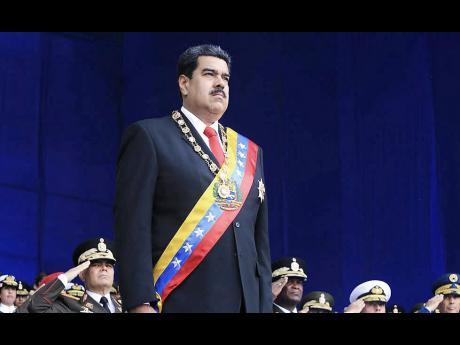As reforms begin, Conoco says Venezuela to pay US$2b award
American oil giant Conoco Phillips says it has reached an agreement with Venezuela's state-owned oil company to recover nearly US$2 billion it was awarded as part of a decade-old expropriation dispute.
Monday's statement from Houston-based Conoco says PDVSA has agreed to recognise the judgment by an international arbitration panel and will make the first US$500-million payment within 90 days and the rest over a period of four years.
In exchange, Conoco will suspend legal actions to seize PDVSA's facilities in the Dutch Antilles that had threatened to disrupt Venezuela's already-depressed oil exports at a time of widespread shortages and hyperinflation. The award is equivalent to more than 20 per cent of cash-strapped Venezuela's foreign currency reserves.
The disclosure comes as Venezuela began to launch reforms announced by President Nicol·s Maduro to rescue the downward-spiralling economy, including a new currency and a more-than-3,000 per cent hike in the minimum wage to take effect September 1.
The changes start with the introduction of a currency that lops five zeros off the country's fast-depreciating bills. Maduro says he'll also raise gasolene prices to international levels to curtail rampant smuggling across borders.
Banks remained closed Monday as they prepared to release the 'sovereign bolivar', the new currency printed with five fewer zeroes in a bid to tame soaring inflation.
Package of Measures
Economists say the package of measures is likely to accelerate hyperinflation rather than address its core economic troubles, like oil production plunging to levels last seen in 1947.
"The bolivar's redenomination will be like going under the knife of one of Caracas' famed plastic surgeons," Johns Hopkins University economist Steve Hanke wrote on www.forbes.com. "Appearances change, but, in reality, nothing changes. That's what's in store for the bolivar: a facelift."
Venezuela was once among Latin America's most prosperous nations, holding the world's largest proven oil reserves, but a recent fall in oil prices accompanied by corruption and mismanagement under two decades of socialist rule have left the economy in a historic economic and political crisis.
Inflation this year could top one million per cent, according to economists at the International Monetary Fund.
Inflation has made it difficult to find paper money. The largest bill under the outgoing cash system was the 100,000-bolivar note, equal to less than three US cents on the commonly used black market exchange rate. A cup of coffee cost more than two million bolivars.
The new paper bills will have two coins and paper denominations ranging from two up to 500. The lowest represents the buying power of 200,000 current bolivars, while the highest stands in for 50 million.
Maduro says he wants to peg wages, prices and pensions to the petro - a cryptocurrency announced in February but which has yet to start circulating. He said one petro would equal US$60, with the goal of moving towards a single floating exchange rate in the future tied to the digital currency.
AP

